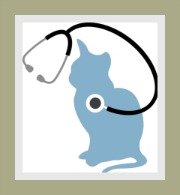Feline Herpes Virus
Cause, Symptoms and Treatment
Feline Herpes Virus (FHV) or Feline Viral Rhinotracheitis (FVR) is one of the major causes of Feline Viral Upper Respiratory Disease which is often referred to as 'cat flu' or feline influenza.
Feline Calicivirus (FCV) is sometimes seen in combination with FHV and other viral and bacterial infections i.e. Bordetella Bronchiseptica and Feline Chlamydia.
This feline respiratory disease is characterized by either mild or
severe symptoms affecting the respiratory tract (i.e. the nose, throat,
pharynx, larynx and lungs) and eyes, causing profuse nasal and eye
discharge.
how feline herpes virus is spread
The feline herpes virus is transmitted by direct contact with cats that have the virus.
The virus is found in the tears, saliva and eye and nasal discharge of an infected cat.
When the cat sneezes (or coughs), droplets become airborne and are then inhaled by healthy cats thereby spreading the virus and causing disease.
Even though the feline rhinotracheitis virus does not survive outside the body or in the environment for longer than 24 hours, it can in this short time be spread via droplet infection or via the hands and clothes of people handling the cat.
Cats that have had the disease and have recovered from it will sometimes become carriers of feline herpes virus.
These cats are generally in good health, but when they are exposed to any form of stress, be it physical or emotional, they will shed the virus thereby infecting healthy cats.
Cats infected with feline herpes virus (FHV) become life-long carriers of the disease, but are only infectious intermittently.
Contaminated bedding, cat furniture, toys and feeding dishes are also a source of in infection.
cats that are at risk
Feline rhinotracheitis is a highly contagious viral infection and can affect cats of all ages, but sadly, kittens are at greatest risk.
High risk groups include:
- Cats receiving corticosteroids.
- Cats undergoing chemotherapy for cancer.
- Cats that are immuno-compromised, for example, cats who are suffering from Feline Leukemia or Feline Aids.
- Kittens and cats that have not received their recommended vaccines.
- Cats that live in multi-cat households or cats that live in large colonies e.g. feral cats.
- Cats living in boarding catteries, breeding catteries and rescue shelters.
symptoms of feline herpes virus
The incubation period (i.e. the time is takes from exposure to the disease to the appearance of the first signs) is between 2 and 6 days.
The symptoms will vary from cat-to-cat and depend on the age and general health of the cat and the amount of feline herpes virus the cat has been exposed to.
Symptoms include:
- Loss of appetite
- General malaise and lethargy (i.e. they cat will be sluggish and depressed)
- Temperature can fluctuate between normal to a raised temperature of 105°F (40°F)
- Frequent and persistent sneezing
Note: Not every sneeze is cat flu!
Cats do occasionally sneeze and this may be
due to a simple irritant (dust, pollen, smoke) or in the case of
frequent sneezing due to fungal or bacterial infections or a symptom of
nasal tumors.
- Nasal infection is known as rhinitis.
- There is a nasal discharge
which starts off as watery and clear and as the feline respiratory
disease progresses, the discharge becomes thick and muco-purulent (full
of mucus and yellow pus).
- The nostrils will become crusted and blocked
making it difficult for the cat or kitten to breathe. (The nasal
discharge may also have traces of blood present)
- The eyes develop conjunctivitis which is an
inflammation of the conjunctiva (mucus membranes of the inner eyelids)
characterized by swollen and red eyes.
- The eye discharge starts off as
watery and clear and as the disease progresses, the discharge become
thick and muco-purulent (full of mucus and yellow pus).
- In severe
cases of FHV the cat may develop corneal ulcers and keratitis.
- Coughing and wheezing and general difficulty in breathing.
- The cat may also produce massive amounts of saliva which makes the cat drool
- Stomatitis is an inflammation of the mouth and tongue. (Mouth ulcers are more common with Feline Calicivirus).
- The
mouth ulcers coupled with the blocked nose is generally the reason why
the cat will not eat.
- If the symptoms are left untreated, the cat or kitten can go on to develop pneumonia which is an infection of the lungs.
- In severe untreated cases, where the cat's immune
system is radically compromised, the gravely ill cat may even develop
skin lesions and abscesses.
- The cat will become susceptible to a host of secondary infections and severe weight loss.
- Pregnant queens with a severe feline herpes virus infection will in all likelihood spontaneously abort her kittens.
Symptoms may last for 6 - 10 days in the case of a mild infection.
In
untreated and severe cases the symptoms may last for up to 6 weeks.
diagnosing feline herpes
An experienced veterinarian will be able to identify feline viral rhinotracheitis at a glance.
However, it is important to determine the cause, as Bordetella Bronchiseptica, FHV and Feline Calicivirus present with very similar symptoms.
In order to do this, the vet will take a throat swab which
will be sent to a laboratory for examination and confirmation of the
diagnosis.
feline herpes treatment | prevention
There is no specific treatment for feline rhinotracheitis i.e. no anti-viral that will miraculously cure the disease.
Treatment is symptomatic - treating the individual symptoms coupled with intensive nursing care and lots of TLC.
The treatment for feline herpes is discussed in detail in the chapter on cat flu.
Cat vaccines against this highly contagious disease is highly recommended.
Feline vaccinations induce or enhance the cat's immune system and whilst it will not prevent the disease, it will drastically reduce the severity of this contagious disease.
FHV vaccine is a core vaccine and is normally given with routine vaccines.
A kitten will receive antibodies from its mother if she is immune to cat flu, but this will only offer short-term immunity against feline herpes.
It is crucial that kittens are immunized at around 6 - 8 weeks.
Cats that present with feline rhinotracheitis symptoms should be
isolated from healthy cats to prevent the spread of the disease.
Related Pages:
Top of Feline Herpes Virus
Return to Cat Flu
search our site
please like us
share our site
recommend on google
favorite pages





